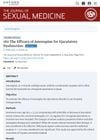Search
forLearn
2 / 2 resultslearn Osteopontin
signaling protein that, when suppressed, may grow hair by reducing inflammation and stem cell loss
Research
5 / 339 resultsresearch Ejaculatory Dysfunction in the Treatment of Lower Urinary Tract Symptoms
Treatments for urinary symptoms often cause ejaculatory problems.

research The Role of Benign Prostatic Hyperplasia Treatments in Ejaculatory Dysfunction
Treatments for enlarged prostate can cause problems with ejaculation, and less invasive options might preserve sexual function better.

research Clinical Review of Ejaculatory Dysfunction
The review suggests new ways to classify ejaculation problems and recommends different treatments based on the type of issue.

research The Efficacy of Amoxapine for Ejaculatory Dysfunction
Amoxapine may be effective for treating ejaculatory dysfunction.

research Sexual Dysfunction Related to Drugs: A Critical Review. Part V: Alpha-Blocker and 5-ARI Drugs
α-Blockers and 5-ARIs for BPH can cause sexual dysfunction, including erectile and ejaculatory issues.
Community Join
5 / 34 resultscommunity Study of thousands of Fin users over 20 years finds no evidence of Fin induced sexual dysfunction
The conversation is about a finding that finasteride does not significantly increase the risk of sexual dysfunction, with users sharing mixed personal experiences regarding side effects.
community Why is Finasteride seen as “scary” for men, but hormonal birth control is totally normalized for women?
Finasteride is seen as risky for men due to side effects like erectile dysfunction, while hormonal birth control for women is normalized despite its side effects. The discussion points out a double standard influenced by societal and gender norms.
community 1 yr on fin, min & dermaroller
User Clay1211 shared 1-year progress using finasteride, minoxidil, and dermaroller for hair loss. Commenters expressed surprise and praised the impressive results.
community Topical dutasteride is superior to oral finasteride
Topical dutasteride is more effective than oral finasteride for male pattern hair loss, with fewer side effects. Some prefer oral treatments for convenience, while others use topical solutions like minoxidil and dutasteride, sometimes with microneedling, for better results.
community Any growth (been taking iron supplements)
The conversation discusses hair loss treatments, focusing on iron supplements for low ferritin levels and considering finasteride and minoxidil if thinning persists. There is debate over starting with finasteride versus dutasteride, with some users advocating for dutasteride due to its potency, while others caution about potential side effects.